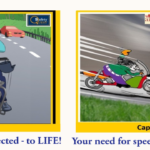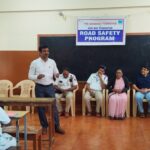This post is by Anuj Tambwekar
This is not to take away anything from the tremendous effort required to contain and counter the coronavirus outbreak. It is a reflection on the lessons for road safety.
As of today, COVID 19 has been contracted by atleast 1,74,000 people, and has killed 6,684 of them (source https://www.worldometers.info/coronavirus/). The reason people are (rightfully) scared of the novel coronavirus is twofold –
1) it is growing exponentially
2) it is unseen and relatively unknown
(Some naive math incoming)
Exponential growth means the number of cases on a day is some multiple (>1) of the cases the previous day. Scientists speculate a growth rate of about 15%, meaning that each day the total number of cases is 1.15 times the number on the previous day. While this may not seem like much, to put it into perspective, it means every 5 days the total cases double. If we have 100 cases on a particular day, in 5 more days it’ll double to 200, and within a month it’ll be over 6000.
The second point is that COVID is unseen, a new strain, and people are scared about how it passes on from person to person.
To beat the pandemic, the growth factor needs to come down below 1. When this happens the growth slows down and eventually conditions will stabilize. To do this people are adopting defensive measures. Washing hands, staying at home, sneezing and coughing into sleeves, etc. “Social Distancing” is the new buzzword. The basic premise is that you don’t know who might be infected and whether you are already compromised, so you take up defensive measures to prevent the disease from getting to you, or spreading from you. In fact, the advice is that we should act as though we are potentially spreading the disease, and therefore act defensively to curb its transmission.
There is no doubt that a lot of concerted effort is required worldwide to contain and counter the Coronavirus. But it puts the challenge of road safety into perspective.
Over 400 people die every day on Indian roads. It’s not okay to compare this number to any of the numbers from the nCov pandemic because this growth is linear and not exponential. But, even so, it is still a very large number. Over the course of 1 year, we will lose about 1.5 lakh people to road accidents in India! It is therefore important to realize what we can learn from the COVID experience and how we can apply it to road safety.
The takeaway is that the way we can curb the fatalities on the road is the same way we flatten the curve to contain the COVID pandemic – Defensive measures!
We do not know who might be driving rashly on the road, so we can only be proactive and control how safely we ourselves drive with alert anticipation.
Distance is advocated for keeping the virus at bay. And the same holds for driving – maintain safe distance!
We avoid crowded places during the outbreak – how about reducing the crowding on our streets? While public transport options may be avoided in these times, it is the one solution that will help reduce the congestion on the streets and thus reduce the incidents.
The reason lots of people don’t take road safety as seriously, is simply because they feel the opposite as to what people feel about COVID. They feel “nothing will happen to me” as opposed to “I could get it from anybody”.
Accidents are fairly commonplace and everyone sees them. Very few people have actually seen a case of COVID in front of them. Human nature makes us scared of the unknown and stupidly brave of the known.
The end goal should be the same – minimise the loss of human life. We have to learn from the current scenario and make the right decisions. Equally important is to carry the same knowledge and experience and apply it to other places where it is just as relevant.
And, as the ancient wisdom says, Prevention is always better than Cure!
************
Sources of the graphics:
Logo from Road Safety Team at Northamptonshire Highways
Covid-19 news on Moneycontrol.com





